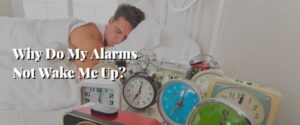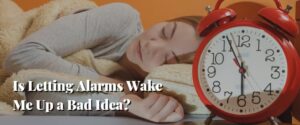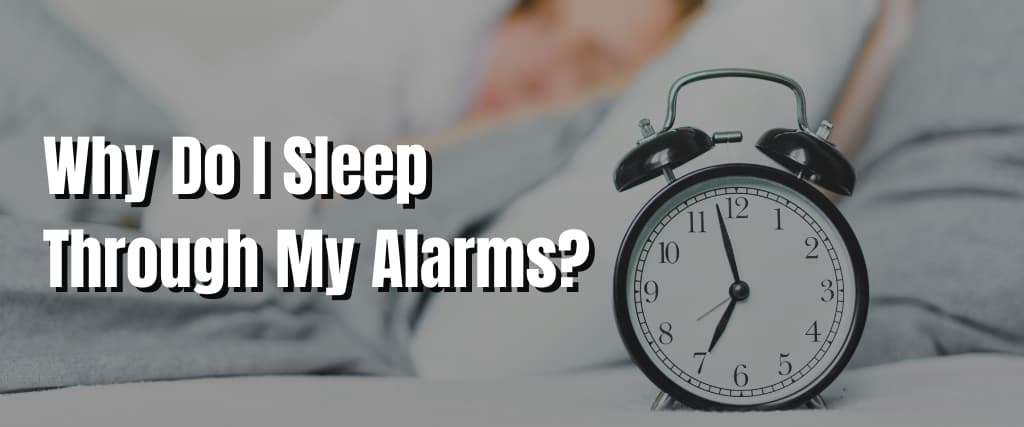There are typically two sorts of people in their natural sleeping patterns: early birds or night owls. Early risers typically have no trouble rising in the early hours of the morning, whereas night owls often have no trouble remaining up till the early hours of the morning.
These are the two extremes of either staying up too late or waking up very early, but as one article by Harvard suggests, “most folks fall somewhere in the middle.” While these chronotypes may be hardwired, and we tend to lean towards one or the other, it still doesn’t mean you can’t have control over your sleep patterns.
This article will examine why you snooze your alarm in the first place and learn how you can solve the problem, so keep on reading.
Why Do I Sleep Through My Alarm?

There are a couple of possible reasons one might not hear their alarms.
The REM and non-REM phases of sleep make up five sleep cycle stages: wake, N1, N2, N3, and REM. The first two stages are characterized by light sleep, which is simple to awaken.
In the third and fourth phases, the sleeper will start to drift more and more and enter into “deep sleep.” These are the stages when your body seeks to conserve energy for the next day, making them the most difficult to awaken from.
But if you happen to wake while in a deep sleep, your body will experience “sleep inertia” — the sense of heavy limbs, bewilderment, and overwhelming want to go back to sleep when you first wake up.
1. Natural Heavy Sleepers

Some individuals find it easy to stay asleep, even in a “chaotic” environment with loud commotions like movements or music.
This might be influenced by particular brain rhythms known as “sleep spindles,” which are generated differently by different people in different amounts.
If you tend to oversleep, your brain probably produces more spindles, making it more challenging to get up in the morning, even if the alarm is loud enough.
2. Inconsistent Sleeping Patterns

The rapid changes in our social-economical life have made it almost impossible to have a consistent sleeping pattern; it’s pretty typical to have erratic sleeping patterns. Your sleep habits, in most cases, may be impacted by shift work, light glare from electronics, stress, sleep disorders, or mental health issues.
If you don’t receive between seven and nine hours of sleep each night, you typically try to make up for it by sleeping longer or later into the day.
And if it happens frequently, you could educate your body to go to sleep deep in the morning hours. Since you are most likely not hearing it as a wake-up call, continually pressing the snooze button (physically or in your dreams) or repeatedly striking it.
3. Sleeping Disorders

Sleep disorders are neurological illnesses that may affect your sleep in various ways. They frequently disrupt your sleep pattern, making it difficult to get to sleep, stay asleep, or wake up in the morning.
Sleep problems, such as sleep apnea, significantly reduce the quality of your sleep and keep you from establishing a regular sleeping schedule. Thus, when you have to get up early to leave for work in the morning, you can be in deep slumber, which is much more difficult to awaken from.
Additionally, some drugs, such as sleeping medicines, might interfere with your sleep cycle and make it quite challenging to hear the alarm. Beta-blockers are also in the group of drugs that assist control of blood pressure. One of their most frequent adverse effects is difficulty getting up in the morning and afternoon lethargy.
4. Mental Health Issues

It might be challenging to draw a link between sleep and mental health problems. In essence, one is made worse by the other, and in the end, it’s challenging to determine which one came first.
These conditions and others can disrupt your internal clock, resulting in either oversleeping or undersleeping and difficulties going to sleep. These conditions include depression, anxiety, PTSD, bipolar disorder, and more.
People with depression are mainly known for oversleeping and not caring about the alarm clock since they frequently have little to no motivation to get out of bed.
You must get the proper care if you believe you are experiencing a mental health problem. This will make it easier for you to wake up in the morning, hear your alarm, and help you cope with various other incapacitating symptoms.
What Is the Best Solution for Stop Sleeping Through Alarm?

Even if you are a devoted night owl and a heavy sleeper, there are methods to get up earlier in the morning and manage to hear your alarm for the first time in a long time.
-
Establish a Good Sleep Routine

In addition to helping you get through the morning, a regular sleep schedule is beneficial for your general health.
It is easy to make and follow a sleeping plan. Simply ensure you go to sleep and wake up every day simultaneously. When you do this often, which becomes ingrained in your behavior, it gets easier and easier to wake up in the morning and leave your bed.
You’ll also feel considerably more rested and be more able to maintain alertness throughout the entire day.
Ensure you sleep for at least seven hours each night to guarantee that you obtain high-quality rest. You’ll probably want to get to bed earlier than usual if you’re a night owl.
If you have trouble drifting off to sleep earlier, you might attempt to set your bedtime 15 minutes earlier each night than the night before.
-
Sleep Hygiene is Key

Sleep hygiene refers to a set of practices to help you take naps sooner and sleep better overall.
Maintaining a healthy sleeping schedule entails creating regular sleep habits and receiving enough sleep.
Improving your nutrition, exercising frequently, and drinking enough water to keep hydrated during the day are pillars of sleep hygiene. Remember to do all these activities for your general health, not only for better sleep.
Avoid caffeinated beverages, such as coffee, carbonated beverages, mate, black tea, and energy drinks, a few hours before bedtime. Also, excessive exercise keeps us more alert, so you should avoid it before bedtime.
Instead, engage in things that can keep you calm. For example, you can read your favourite book, listen to soothing music or natural sounds, or do nighttime stretches or yoga.
Additionally, you should refrain from using your electronic gadgets at least an hour before bed. The blue light they generate is well known for interfering with your circadian clock and delaying bedtime. Blue light is fantastic in the morning because it urges you to stay alert but confuses your body at night.
-
Look for Inspiration to Wake Up Early

Suppose you want to avoid oversleeping; you can try some motivation hacks. Set up a breakfast or coffee date with a loved one, such as your spouse, family member, or close friend, in the morning. Or, arrange gym sessions and morning runs if you’re a physical exercise enthusiast.
You might also try to create a morning objective or job for yourself, which you can set up at dawn if you prefer a particular workout.
-
Buy a New Alarm or Change the Alarm Sound

If none of the above solutions works for you, you might want to just invest in a more effective alarm. While this may sound too simple, there are occasions when the most straightforward answer is the best.
If you use the snooze button often, your alarm may not be strong enough.
You may alter the alarm sound alone instead of altering the alarm clock entirely. Additionally, you may set a loud alarm and position the phone or clock so that you can’t readily get them, forcing you out of bed.
Some inventive alarm clocks are on the market, designed expressly for folks who oversleep and don’t take their alarms seriously.
If you want to use your smartphone as an alarm clock, you may instal applications such as Sleep Cycle or Alarmy. These innovative alarm clock applications monitor your sleeping habits and wake you up when it is easiest for you to get up, i.e. when you are in a light sleep phase.
-
Use Natural Light

This one is also relatively easy; all you have to do is leave your draperies or blinds open when you go to bed at night, and there you have it. The following day, you’ll be woken up by a flood of natural light.
Getting a dawn lamp or sunrise alarm clock can be a good idea if your bedroom doesn’t get much light or if you need to wake up while it’s still dark. These gadgets are made to produce light from the sun inside your home whenever you need them to.
Additionally, a type of alarm clock known as a phototherapy alarm clock replicates the morning sun by gradually increasing light intensity, making it easier for you to get up.
In the morning and throughout the day, natural light is quite helpful in keeping us alert. Since when have people been swearing by it for decades, even millennia?
Conclusion
There are several reasons someone could frequently oversleep and press the mute button on their smartphones or alarm clocks, as you could discover from this article.
There are methods to prevent this, and you can establish a regular, healthy sleep routine that your body will appreciate.
You can quickly get back on track with a bit of willpower, more patience, and maybe a better alarm clock.
Related Questions
What Does Sleeping Through Your Alarm Mean?
Sleeping through your alarm means that you continue to sleep even after the alarm rings may be because of stress, anxiety, or fatigue. Others may experience this as physically sleeping through their alarm since they have trouble falling asleep at night or because they are so exhausted that they cannot hear the sound.
Why Do My Alarms Not Wake Me Up?

You may sleep through your alarm because of anxiety, stress, and mental illness. Also, consistently disregarding your alarm may be caused by a default in your alarm clock rather than with you. Nothing may wake you anymore because your alarm clock is too faint or silent. Instead, consider buying an alarm clock for those who sleep a lot or using an online alarm clock.
Is Letting Alarms Wake Me Up a Bad Idea?

Letting the alarm wake you up is not always a bad idea, but it can have some health issues. For example, unexpected awakenings can increase heart rate and blood pressure. An alarm can raise your stress levels and your blood pressure by causing your adrenaline to rise. Try gradually waking up to natural light as an alternative to this health-harming condition.






